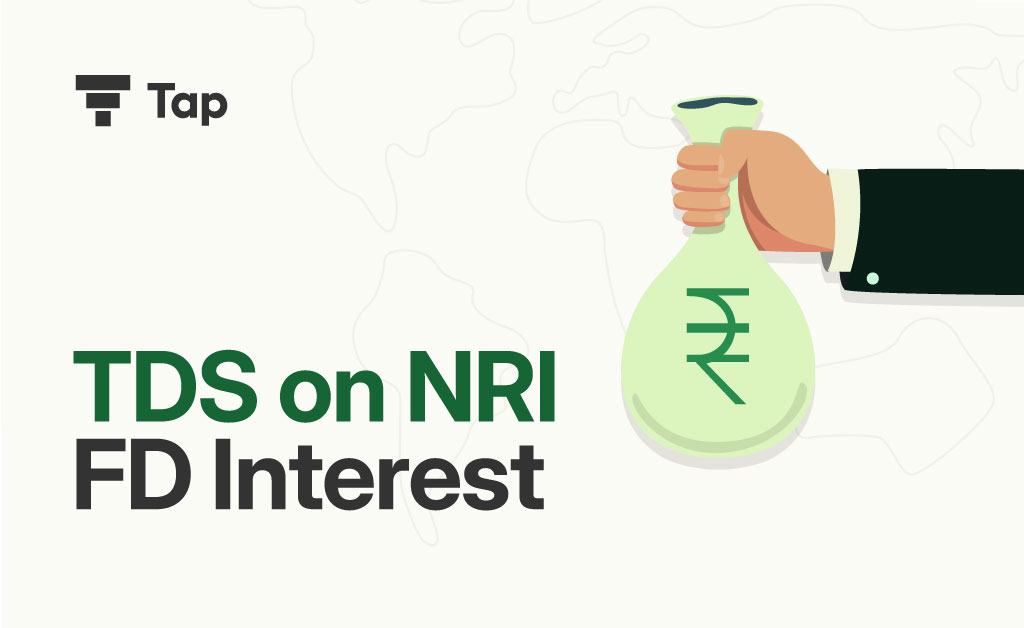TDS on NRI FD Interest: Informative Guide

Overview:
FDs are a popular choice for their safety and steady returns. But there’s a tax called TDS (Tax Deducted at Source) that you need to be aware of. This quick guide explains how TDS works with NRI FDs.
Understanding TDS on NRI FD Interest
TDS on NRI FD Interest refers to the tax deducted at the source by the bank or financial institution where the NRI has invested in a Fixed Deposit. This deduction is mandated by the Income Tax Act, 1961, to ensure that taxes are collected in advance from income generated by NRIs in India.
Is NRI FD Interest Taxable?
Yes, the interest earned on NRI FDs is taxable in India. The taxation varies based on the type of NRI FD account:
1. NRO (Non-Resident Ordinary) FDs: Interest earned on NRO FDs is fully taxable at the slab rate applicable to the NRI. Additionally, a TDS of 30% (plus applicable surcharge and cess) is levied on the interest income. This rate might vary based on the double taxation avoidance agreement (DTAA) between India and the NRI’s resident country.
2. NRE (Non-Resident External) FDs: Interest earned on NRE FDs is tax-free in India. However, it is advisable to check the tax regulations in the NRI’s resident country, as the interest might be taxable there.
Minimizing TDS on NRI FD Interest
If you have an NRO account, here are some ways to potentially reduce TDS:
- Link your PAN card with your bank account.
- Explore Double Taxation Avoidance Agreement (DTAA) benefits. If India has a DTAA with your resident country, you might be eligible for a lower TDS rate.
A tax advisor can help determine your eligibility and guide you through claiming treaty benefits.
Key Points to Remember:
- NRE FD interest is tax-free.
- NRO FD interest is taxable and subject to TDS.
- Link PAN and explore DTAA for potentially lower TDS.
Understanding TDS Rates On NRI FD:
The TDS rates on NRI FD interest vary depending on the type of FD and the residency status of the NRI. Here’s a breakdown:
– For NRO FDs, the TDS rate is typically 30% (plus applicable surcharge and cess) on the interest earned.
– For NRE FDs, there is no TDS deducted, as the interest income is tax-free in India.
Deductions and Exemptions For TDS on NRI FD Interest:
While TDS is deducted at source, NRIs can claim deductions and exemptions while filing their income tax returns to optimize their tax outgo. Some common deductions and exemptions include:
– Tax Treaty Benefits: NRIs can avail benefits under the Double Taxation Avoidance Agreement (DTAA) between India and their resident country to reduce tax liabilities.
– Basic Exemption Limit: NRIs are entitled to the basic exemption limit available to resident Indians. For the assessment year 2023-24, this limit is ₹2.5 lakhs for individuals below 60 years of age.
– Interest Income Exemption: Interest income up to ₹50,000 from bank and post office deposits is exempt under Section 80TTB for senior citizens (aged 60 years or above).
Conclusion:
In conclusion, understanding the TDS on NRI FD interest is essential for NRIs to effectively manage their tax liabilities and maximize returns from their investments in India. By comprehending the tax implications, leveraging deductions, and staying informed about regulatory changes, NRIs can navigate the intricacies of taxation and optimize their investment strategies. It’s advisable for NRIs to consult with tax professionals or financial advisors to ensure compliance with tax regulations and make informed decisions regarding their investments.
Ready to invest and simplify your NRI finances?
Tap Invest offers a wide range of fixed-income options to suit your goals. Minimize TDS on your NRO FDs and maximize your returns. Sign up today and explore a smarter way to invest!
Key FAQs On TDS on NRI FD Interest
- Is FD interest taxable for NRI?
Yes, FD interest is taxable for NRIs in India. Interest earned on NRO FDs is fully taxable, while interest earned on NRE FDs is tax-free in India.
- Can NRI open fd account in india ?
Yes, NRIs (Non-Resident Indians) can open Fixed Deposit (FD) accounts in India. They can open both NRE (Non-Resident External) FD accounts and NRO (Non-Resident Ordinary) FD accounts, depending on their financial needs and objectives.
- How much interest on FD is TDS free?
In India, interest earned on Fixed Deposits (FDs) up to ₹40,000 per financial year is TDS (Tax Deducted at Source) free for individuals under the age of 60. For senior citizens aged 60 and above, the TDS-free limit is ₹50,000 per financial year.
- What is TDS on NRO FD interest?
The TDS rate on interest earned from NRO deposits is set at 30.90%. However, if the interest amount paid exceeds Rs. 10 lakhs, the TDS rate increases to 33.99%. NRIs from countries with a Double Taxation Avoidance Agreement (DTAA) with India may qualify for a lower TDS rate.
- How to avoid TDS for NRI?
- Open an NRE account for tax-free interest (if funds come from abroad).
- Link PAN card to your NRO account (lowers TDS rate).
- Explore DTAA benefits (potentially lower TDS with a tax advisor’s help)
